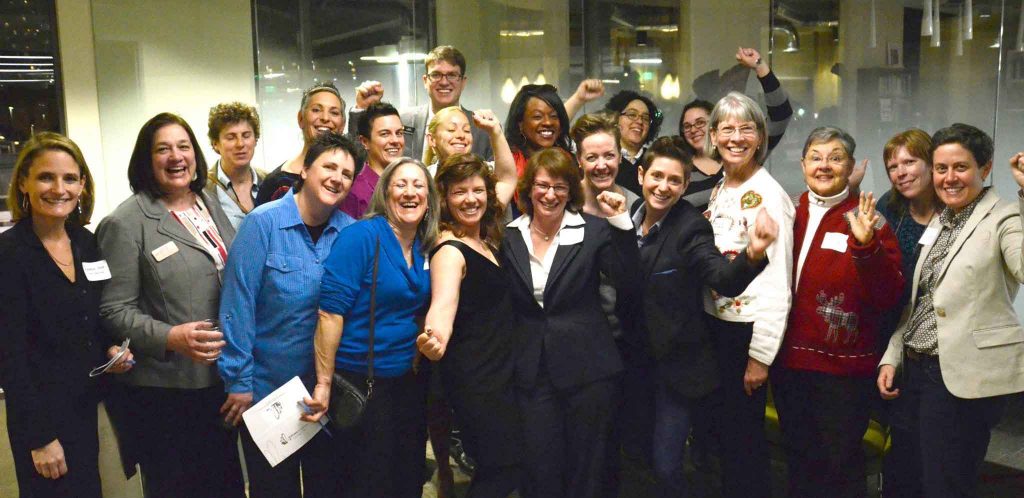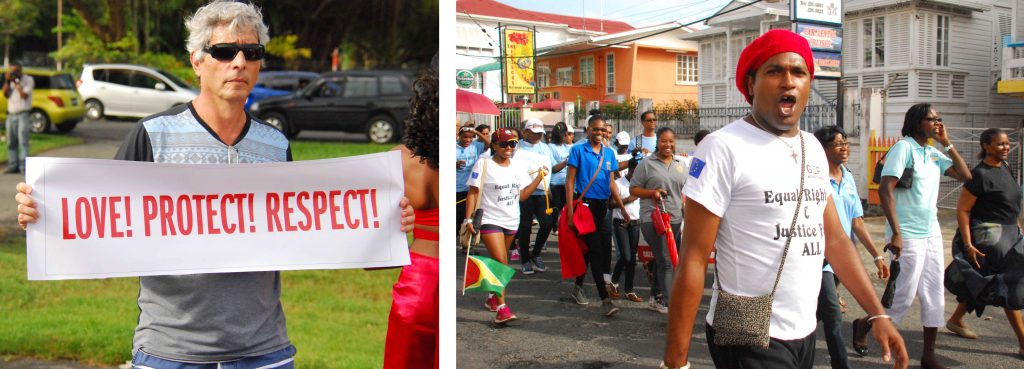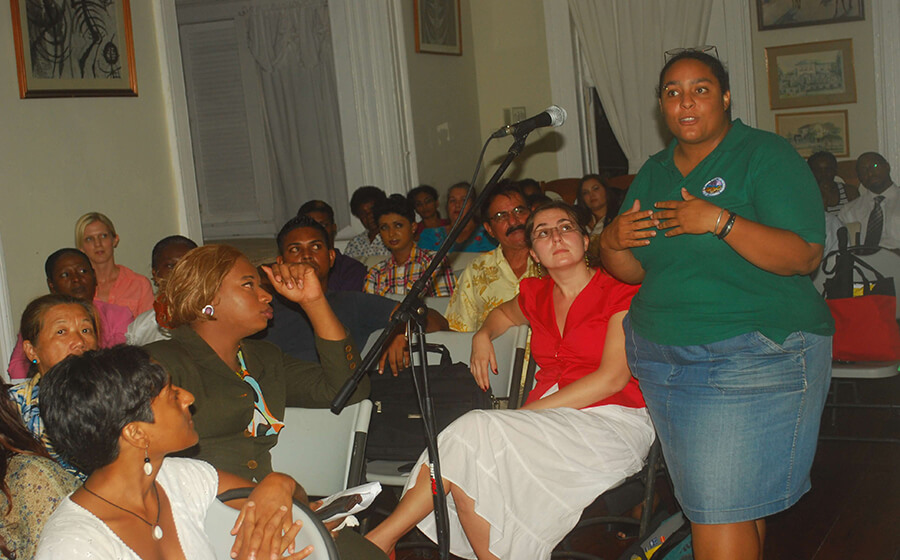Location: Georgetown
6.7874715, -58.1863936
Love is a Revolutionary Practice
Love is a Revolutionary Practice
To love in these times is revolutionary. We are reminded, every day, how radical it is to truly love as we confront homophobic laws, violence and discrimination. As radical philanthropists, activists, organizers and artists, we fight to make this world a better place for LGBTQI folks everywhere. Love–motivating lots of hard work & brilliant organizing–will create this world. We should never have to choose safety over self-determination. An army of lovers cannot fail!
On this Valentine’s day, we celebrate our brilliant and brave community who live the Revolution of Love by:
Painting the town Pink in Colombia

Becoming Penpals with incacerated LGBTQI folks
By building community and working to demolish the violent prison system.

Black & Pink, Astraea grantee partner running a LGBTQ prisoner newsletter and Penpal program
Raising fists against violence and demanding lesbian rights in Honduras

Red Lésbica Cattrachas Honduras
Taking queer and trans* power to the streets!
.jpg)

E.D. J. Bob Alotta with Astraea Program Officer, Namita Chad, 2015
Making art not war, because all queer her-stories are important
Guyana Trans United (GTU) and the Society Against Sexual Orientation Discrimination (SASOD) hosted a week-long “Stand Against Transphobia” photo exhibition of work by artist and curator Ulelli Verbeke.
Opening hearts and homes for fundraising
Astraea donors come together to raise funds at house parties to resource LGBTQI work.

Friends gather at Fran and Anna Simon’s Denver House Party, 2015
Choosing safety over truth, and being an army of lovers marching for equality
More than 300 folks walked for equality to end all violence in Guyana

Waging love with our wallets
Every penny counts. Whether it’s $5 or $5000 every month because love and compassion go hand in hand.
To the thousands of donors who support us, we love you.
To the fearless folks on the frontlines, we love you.

The moment we choose to love we begin to move towards freedom, to act in ways that liberate ourselves and others. That action is the testimony of love as the practice of freedom.
10 LGBTQI Activist Moments of 2013
At Astraea Lesbian Foundation for Justice, the last days of the year are a time to honor brave leaps forward and take stock of political set backs for LGBTQI rights activism in 2013. By no means comprehensive, we offer a brief survey of ten moments of LGBTQI activism around the globe in 2013. Join the conversation online and share more moments with us on facebook and twitter using #LGBTQIActivistMoments!
At Astraea Lesbian Foundation for Justice, the last days of the year are a time to honor brave leaps forward and take stock of political set backs for LGBTQI rights activism in 2013. By no means comprehensive, we offer a brief survey of ten moments of LGBTQI activism around the globe in 2013. Join the conversation online and share more moments with us on facebook and twitter using #LGBTQIActivistMoments!
 1. Edith Windsors win for Marriage Equality: the Defense of Marriage Act is declared unconstitutional by U.S. Supreme Court. Federal recognition is afforded to same-sex marriages performed under state law. The U.S. becomes one of a handful of countries pushing same-sex marriage forward.
1. Edith Windsors win for Marriage Equality: the Defense of Marriage Act is declared unconstitutional by U.S. Supreme Court. Federal recognition is afforded to same-sex marriages performed under state law. The U.S. becomes one of a handful of countries pushing same-sex marriage forward.
 2. In a set back in Colombia, the nations same-sex marriage bill failed to pass the Senate and bypass coalition opposition led by the Attorney General. Legal ambiguity remains, however, with constitutional recognition of legal registry in effect. Couples can approach notaries or judges to marry, but their requests remain in the hands of officials who can deny them.
2. In a set back in Colombia, the nations same-sex marriage bill failed to pass the Senate and bypass coalition opposition led by the Attorney General. Legal ambiguity remains, however, with constitutional recognition of legal registry in effect. Couples can approach notaries or judges to marry, but their requests remain in the hands of officials who can deny them.
 3. Years of policy advocacy, movement building, and direct action by LGBTQI activists of color produced hard-fought victories for immigration rights in California. The city of San Francisco passed an ordinance limiting the Secure Communities program (S-Comm), effectively reducing the threat of deportation to anyone arrested by local police. And the state of California passed the Trust Act, prohibiting local law enforcement agencies from detaining people for deportation if arrested for a minor or non-violent crime and are otherwise eligible to be released from custody.
3. Years of policy advocacy, movement building, and direct action by LGBTQI activists of color produced hard-fought victories for immigration rights in California. The city of San Francisco passed an ordinance limiting the Secure Communities program (S-Comm), effectively reducing the threat of deportation to anyone arrested by local police. And the state of California passed the Trust Act, prohibiting local law enforcement agencies from detaining people for deportation if arrested for a minor or non-violent crime and are otherwise eligible to be released from custody.
 4. New York City Council passed the Community Safety Act, winning New Yorkers protection from the New York Police Departments stop-and-frisk policy. Simultaneously, Federal Judge Shira Scheindlin issued a decision declaring stop-and-frisk as practiced by the NYPD unconstitutional. While this ruling was appealed by Mayor Mike Bloomberg’s administration, Mayor-Elect Bill DeBlasio has pledged to drop this appeal and it remains to be seen exactly how these new protections against police abuse will be enacted.
4. New York City Council passed the Community Safety Act, winning New Yorkers protection from the New York Police Departments stop-and-frisk policy. Simultaneously, Federal Judge Shira Scheindlin issued a decision declaring stop-and-frisk as practiced by the NYPD unconstitutional. While this ruling was appealed by Mayor Mike Bloomberg’s administration, Mayor-Elect Bill DeBlasio has pledged to drop this appeal and it remains to be seen exactly how these new protections against police abuse will be enacted.
 5. Ugandan LGBTI advocacy groups made collective strides pinpointing American evangelist involvement in anti-gay persecution in Uganda. The U.S. court case “Sexual Minorities Uganda vs. Scott Lively” moved forward while the Ugandan parliament unexpectedly passed its Kill the Gays bill.
5. Ugandan LGBTI advocacy groups made collective strides pinpointing American evangelist involvement in anti-gay persecution in Uganda. The U.S. court case “Sexual Minorities Uganda vs. Scott Lively” moved forward while the Ugandan parliament unexpectedly passed its Kill the Gays bill.
 6. Cuban lawmakers approve a proposal to ban employment discrimination based on sexual orientation.
6. Cuban lawmakers approve a proposal to ban employment discrimination based on sexual orientation.
 7. LGBTQI activism swelled after Indias Supreme Court upheld a colonial-era law, Section 377 of Indias penal code, and recriminalized same-sex relations. The Courts decision overruled a previous ruling of 377 as unconstitutional by the Delhi High Court, and severely set back LGBTQI human rights protections in India.
7. LGBTQI activism swelled after Indias Supreme Court upheld a colonial-era law, Section 377 of Indias penal code, and recriminalized same-sex relations. The Courts decision overruled a previous ruling of 377 as unconstitutional by the Delhi High Court, and severely set back LGBTQI human rights protections in India.
 8. LGBTQI human rights activists in Russia witnessed a show of support around the winter Olympic games in Sochi. Activists called for action, reporting heightened LGBTQI violence since the Russian government passed an anti-gay propaganda law and conducted nationwide raids of nongovernmental organizations to identify “foreign agents” earlier in the year. International advocacy efforts include Billie Jean King, Brian Boitano, and other gay athletes joining a U.S. delegation to the Olympics.
8. LGBTQI human rights activists in Russia witnessed a show of support around the winter Olympic games in Sochi. Activists called for action, reporting heightened LGBTQI violence since the Russian government passed an anti-gay propaganda law and conducted nationwide raids of nongovernmental organizations to identify “foreign agents” earlier in the year. International advocacy efforts include Billie Jean King, Brian Boitano, and other gay athletes joining a U.S. delegation to the Olympics.
 9. In a unanimous 9-0 ruling, Canada’s Supreme Court decriminalized sex work offering constitutional protections to sex workers’ health and safety.
9. In a unanimous 9-0 ruling, Canada’s Supreme Court decriminalized sex work offering constitutional protections to sex workers’ health and safety.
 10. Guyana courts upheld a partial ban on cross-dressing deeming it illegal if done for “improper purposes.” LGBTQI rights groups in Guyana including Society Against Sexual Orientation Discrimination rallied to appeal the judgment to protect transgender people from being persecuted by 120-year-old law.
10. Guyana courts upheld a partial ban on cross-dressing deeming it illegal if done for “improper purposes.” LGBTQI rights groups in Guyana including Society Against Sexual Orientation Discrimination rallied to appeal the judgment to protect transgender people from being persecuted by 120-year-old law.
Society Against Sexual Orientation Discrimination (SASOD)
SASOD is dedicated to the eradication of homophobia in Guyana and throughout the Caribbean. Since 2003 they have been working tirelessly to repeal discriminatory Guyanese laws, change local attitudes about the LGBT community, advocate for human rights, and end discrimination in the government, workplace, and community.
SASOD is dedicated to the eradication of homophobia in Guyana and throughout the Caribbean. Since 2003 they have been working tirelessly to repeal discriminatory Guyanese laws, change local attitudes about the LGBT community, advocate for human rights, and end discrimination in the government, workplace, and community. Four years ago SASOD and four claimants launched a suit against the 1893 law against male and female “cross-dressing.” In 2013, the Guyana Chief Justice unfortunately did not declare the “cross-dressing law” unconstitutional, stating that the law isn’t discriminatory on the basis of gender because it applies to both men and women. SASOD has submitted an appeal in the hopes the case will be ruled in their favor. In the meantime, SASOD continues to monitor the case, train media outlets on LGBT discrimination, work with trans organizations to develop security protocols, and engage in international advocacy. They aim to pass an amendment to the Prevention of Discrimination Act 1997 to include SOGI and health status as grounds for protection. SASOD recently leveraged Guyana’s 2nd UPR review in January 2015 with a successful media campaign, obtaining coverage on LGBT issues from nearly every media outlet.

.JPG)

